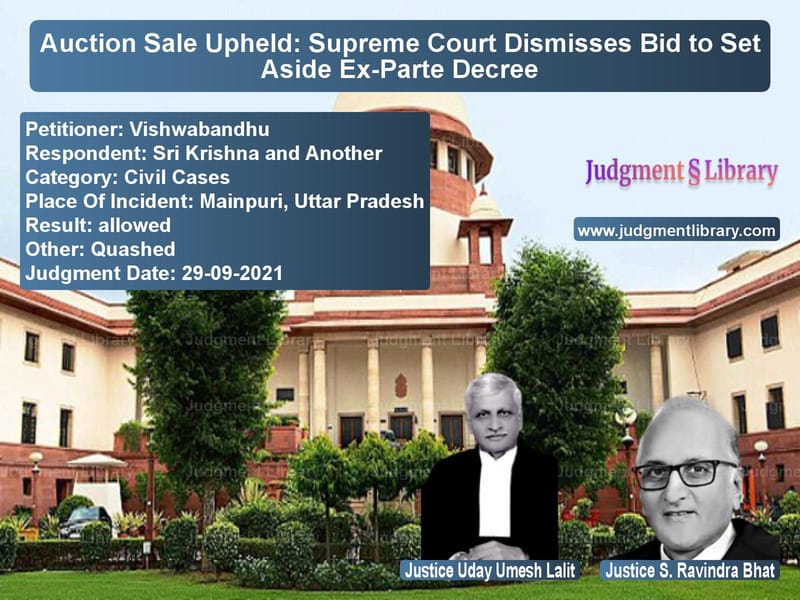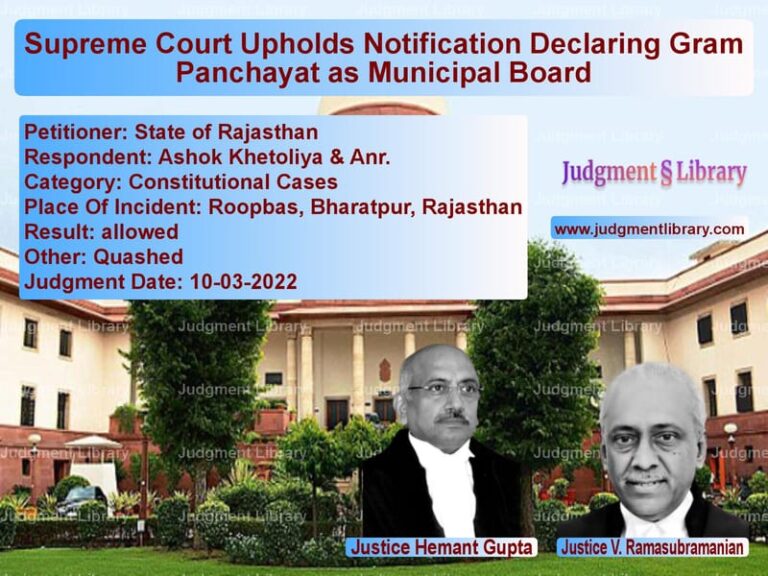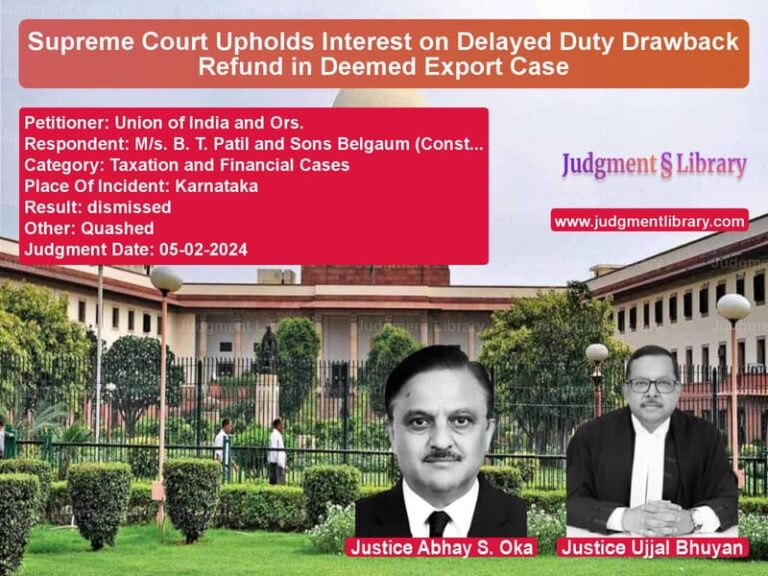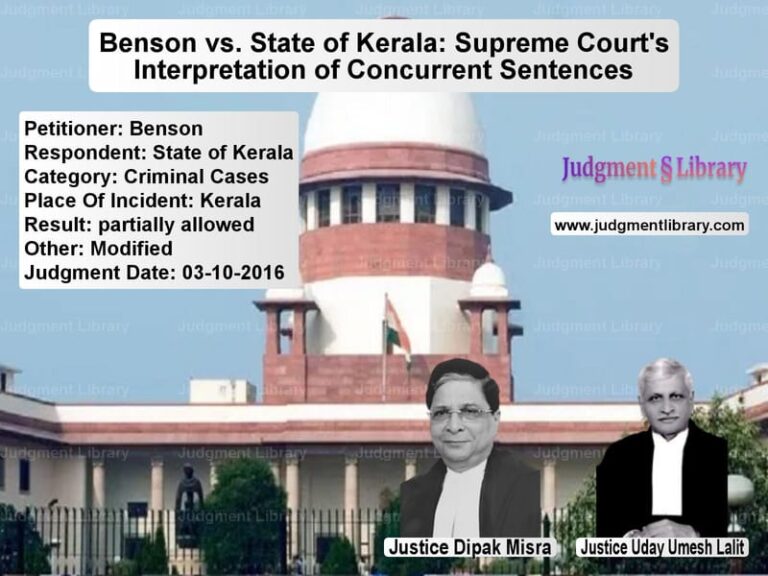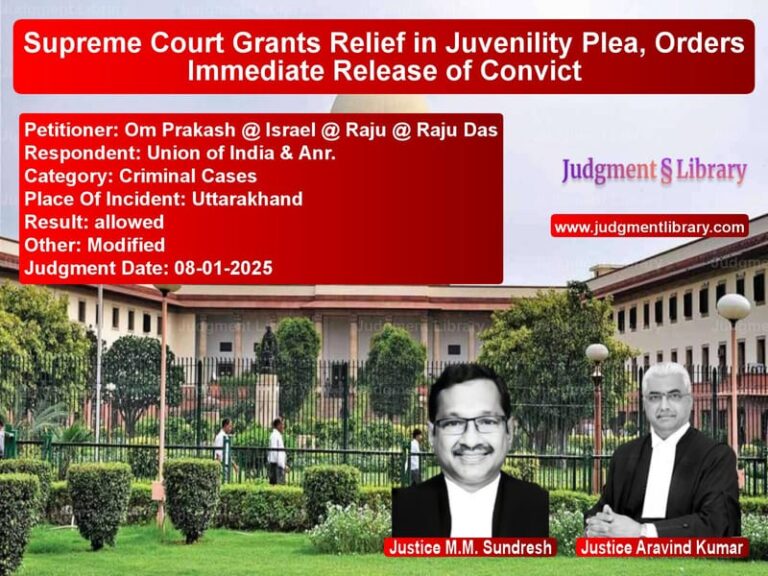Auction Sale Upheld: Supreme Court Dismisses Bid to Set Aside Ex-Parte Decree
The case of Vishwabandhu v. Sri Krishna and Another involved a complex legal dispute over an ex-parte decree, auction sale, and a belated attempt to set aside judicial proceedings. The Supreme Court had to decide whether a defendant who had failed to appear for years could challenge an ex-parte decree after the property in question had already been auctioned and a sale certificate issued. Ultimately, the Court ruled against the defendant, affirming the finality of judicial proceedings and protecting the rights of an auction purchaser.
Background of the Case
The dispute arose from a money recovery suit filed by Respondent No. 2 in the Civil Judge (Junior Division), Mainpuri, Uttar Pradesh. The case involved an unpaid amount of Rs. 22,400, which Respondent No. 1 (the original defendant) had received as part of a property sale agreement but failed to return.
The key events were:
- The suit was filed on May 25, 1993.
- Summons were issued to Respondent No. 1, but he refused to accept service, leading the trial court to proceed ex-parte on February 19, 1997.
- An ex-parte decree was passed against Respondent No. 1 on September 16, 1997, ordering repayment of Rs. 22,400 with 9% interest.
- The decree holder initiated execution proceedings, attaching the property that was originally subject to the agreement.
- The property was auctioned on December 16, 2000, with Vishwabandhu (the appellant) emerging as the highest bidder, purchasing it for Rs. 1,25,000.
- After the auction, Respondent No. 1 filed an application under Order IX Rule 13 of the Civil Procedure Code (CPC) to set aside the ex-parte decree, claiming he was unaware of the proceedings.
Key Legal Issues
The Supreme Court had to determine:
- Whether the ex-parte decree was properly served and legally valid.
- Whether Respondent No. 1 could challenge the decree after the auction sale had already taken place.
- The rights of the auction purchaser, Vishwabandhu, and whether the sale certificate could be revoked.
Petitioner’s Arguments (Vishwabandhu)
The appellant, Vishwabandhu, argued that:
- The ex-parte decree was properly served, as the defendant refused the summons.
- The trial court’s order of February 19, 1997, which recorded the refusal of service, was legally valid.
- The auction sale was conducted lawfully, and the defendant made no attempt to challenge the decree until after the sale was completed.
- The High Court wrongly allowed the defendant’s plea, despite his prolonged negligence.
Respondent’s Arguments (Sri Krishna)
Respondent No. 1 countered that:
- He had no knowledge of the suit or the execution proceedings.
- The auction sale was illegal as he was not given an opportunity to contest the case.
- The High Court rightly restored the suit, allowing him to defend his rights.
Supreme Court’s Observations
The Supreme Court examined the legal and factual aspects of the case and made key observations:
- The trial court had followed due process by sending summons via registered post. The defendant’s refusal to accept service constituted valid service under Order V Rule 9(5) of the CPC.
- The defendant had knowledge of the execution proceedings as of April 2, 2000, but failed to act until after the property was auctioned in December 2000.
- “The summons issued by registered post was received back with postal endorsement of refusal, as would be clear from the order dated 19.02.1997. Sub-Rule (5) of Order V Rule 9 of the Code states inter alia that if the defendant or his agent had refused to take delivery of the postal article containing the summons, the court issuing the summons shall declare that the summons had been duly served on the defendant.”
- The High Court’s decision to allow the restoration of the suit ignored the fact that the defendant had deliberately chosen to remain absent for years.
- “Even after the passing of the ex-parte decree, the report filed by the process server on 04.04.2000 clearly indicated that notice was served upon Respondent No.1 which was duly acknowledged by him by putting signature on the copy of the notice.”
- The rights of an auction purchaser must be protected, as he had lawfully purchased the property in a court-approved auction.
Supreme Court’s Judgment
The Supreme Court allowed the appeal and ruled that:
- The ex-parte decree was valid and properly served.
- The defendant had knowingly allowed the case to proceed uncontested for years.
- The auction sale was final, and the auction purchaser’s rights could not be disturbed.
- The High Court’s order restoring the suit was set aside.
- Respondent No. 1’s application under Order IX Rule 13 CPC was dismissed.
Key Takeaways from the Judgment
- Refusal to accept summons is valid service: If a defendant refuses to accept summons, courts can deem it as served.
- Prolonged inaction weakens a legal claim: Delaying legal action after knowing about a case can result in dismissal of relief.
- Rights of auction purchasers are protected: Courts do not easily revoke judicial sales once completed.
- Ex-parte decrees must be challenged promptly: Applications to set aside ex-parte decrees must be filed within a reasonable time.
- Judicial orders must be respected: Once a sale certificate is issued, courts are reluctant to disturb it.
Conclusion
The Supreme Court’s ruling in Vishwabandhu v. Sri Krishna reinforces the importance of procedural diligence in legal disputes. It establishes that courts will not entertain frivolous attempts to reopen cases after final judgments have been executed. By upholding the rights of the auction purchaser and dismissing the delayed claims of the original defendant, the ruling ensures that judicial processes remain fair and conclusive.
Petitioner Name: Vishwabandhu.Respondent Name: Sri Krishna and Another.Judgment By: Justice Uday Umesh Lalit, Justice S. Ravindra Bhat.Place Of Incident: Mainpuri, Uttar Pradesh.Judgment Date: 29-09-2021.
Don’t miss out on the full details! Download the complete judgment in PDF format below and gain valuable insights instantly!
Download Judgment: vishwabandhu-vs-sri-krishna-and-anot-supreme-court-of-india-judgment-dated-29-09-2021.pdf
Directly Download Judgment: Directly download this Judgment
See all petitions in Property Disputes
See all petitions in Debt Recovery
See all petitions in Specific Performance
See all petitions in Judgment by Uday Umesh Lalit
See all petitions in Judgment by S Ravindra Bhat
See all petitions in allowed
See all petitions in Quashed
See all petitions in supreme court of India judgments September 2021
See all petitions in 2021 judgments
See all posts in Civil Cases Category
See all allowed petitions in Civil Cases Category
See all Dismissed petitions in Civil Cases Category
See all partially allowed petitions in Civil Cases Category

